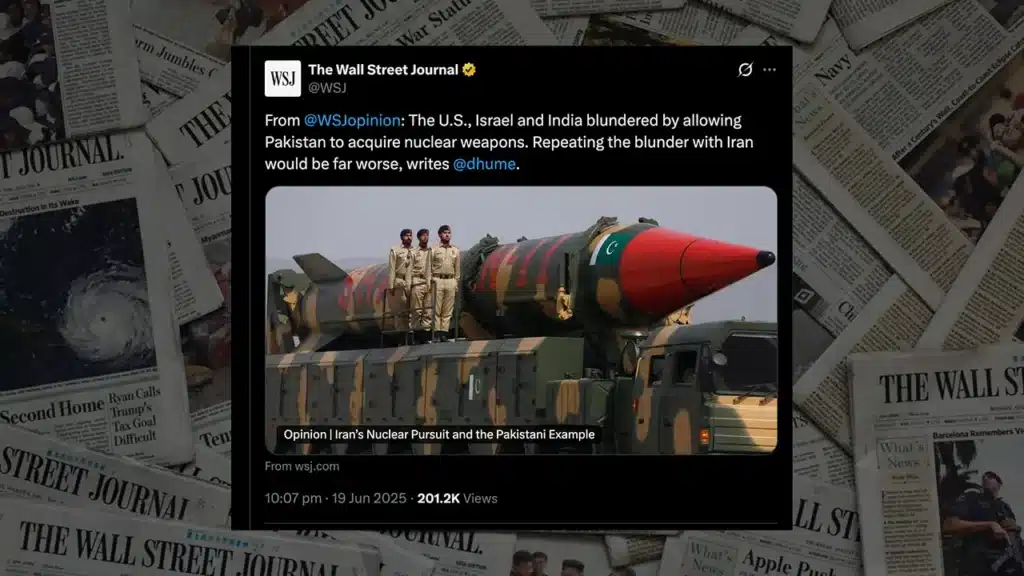During Field Marshal Asim Munir’s ongoing high-level and widely appreciated visit to the United States, a deliberate and poorly disguised propaganda effort has surfaced in The Wall Street Journal, penned by Sadanand Dhume, a known Indian-origin writer with deep ideological affiliations to Narendra Modi’s ruling cult in India. It is no coincidence that this baseless article appeared barely 24 hours after Field Marshal Asim Munir’s significant meeting with President Donald Trump, who not only praised Pakistan’s role in maintaining regional stability but also lauded the clarity and professionalism of Pakistan’s military leadership.
The timing and tone of this article clearly indicate that it is the handiwork of Indian lobbying groups in the US, frustrated by Pakistan’s successful diplomatic outreach and renewed global relevance. Dhume, who is neither an objective analyst nor a credible academic voice, is part of the same network that has repeatedly peddled anti-Pakistan narratives under the guise of journalism and research. His attempts to draw a false equivalence between Pakistan’s well-established, internationally monitored nuclear programme and Iran’s alleged ambitions are not just misleading — they are deliberately crafted distortions aimed at sabotaging Pakistan’s diplomatic momentum.
Pakistan’s nuclear programme is not a clandestine operation; it is a globally recognised and closely regulated deterrent force. International bodies, including the IAEA and strategic arms control forums, have repeatedly affirmed Pakistan’s responsible nuclear conduct. The safety mechanisms, command and control systems, and transparency measures in place have been acknowledged by global experts. Ironically, it is India — not Pakistan — that has been repeatedly flagged in international headlines for incidents of fissile material theft, chemical leaks, and security breaches involving radioactive substances.
Dhume conveniently ignores these facts and chooses to recycle outdated anecdotes and selectively quoted events from the 1980s to construct an anti-Pakistan narrative that suits the Modi regime’s worldview. His article references old, discredited theories and hypothetical operations that never materialised, attempting to revive Cold War-era fears to malign a nuclear-armed Muslim state that has consistently demonstrated restraint despite regional provocations, most often originating from India itself.
The agenda becomes even more transparent when one examines Dhume’s own track record. Far from being a neutral observer, he is a cheerleader for Narendra Modi’s ideological project. His upcoming book glorifying Modi’s tenure is an obvious career manoeuvre to gain proximity to India’s ruling elite. Using WSJ’s platform to curry favour with the Indian government by attacking Pakistan’s security credentials is not journalism — it is opportunistic lobbying disguised as opinion writing.
It is deeply unfortunate and, frankly, irresponsible for a globally reputed outlet like The Wall Street Journal to lend space to such a thinly veiled propaganda article that lacks factual grounding, strategic insight, or academic integrity. The publication has not only undermined its editorial credibility but also allowed itself to become a platform for geopolitical misinformation at a time when responsible journalism is needed the most.
If anything, this piece highlights the desperation of Indian lobbies and their aligned proxies in the US who are unable to digest Pakistan’s rising global stature, especially under the current leadership of Field Marshal Asim Munir. The world no longer buys the narrative of a reckless Pakistan — it recognises Pakistan as a key player in regional and global peace efforts, a responsible nuclear power, and a country that continues to demonstrate maturity in the face of relentless Indian propaganda and destabilisation attempts.





